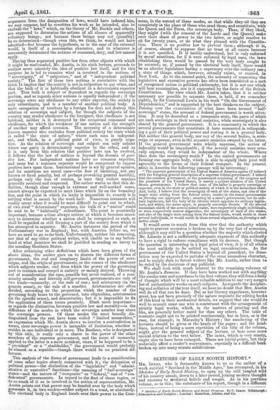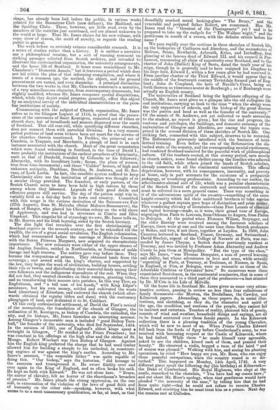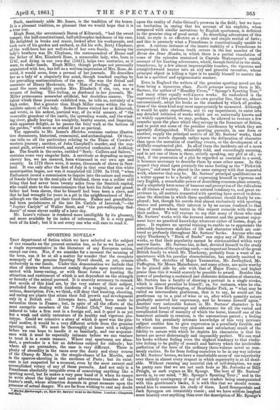SKETCHES OF EARLY SCOTCH HISTORY.*
Mu. burs, who is favourably- known to us as the author of a work entitled " Scotland in the Middle Ages," has attempted, in his Sketches of Early Scotch History, to open up the still tangled wild of his country annals, down to a later period, joining modern thought and customs to mediaeval beliefs and usages. As in his previous volume, so in this ; the substance of his report, though in a different * Sketches of Early Scotch History and Social Progress. By C. limes. Edinburgh: Edmonton and Douglas ; London • liamilion, Adams, and Co.
shape, has already been laid before the public, in various works printed for the Bannatyne Club (now defunct), the Maitland, and the Spalding Clubs.. These, however, are little read, even by the members of the societies just mentioned, and are almost unknown to the world at large. Thus Mr. Ines claims for his new volume, with some show of reason, the merit of novelty, as regards the reading public in general. The work before us certainly evinces considerable research. It is a series of studies rather than a history. It is neither a narrative nor a philosophical treatise, but a sort of running comment on striking passages selected from Scotch archives, and intended to illustrate the ecclesiastical organization, the university arrangements, and the home life of Scotland. It bears some resemblance to Mr. Chambers's " Domestic Annals," but it traverses a period which does not fall within the plan of that informing compilation, and where it treats of a common age, the method, the object, and the general presentment are varied, and even dissimilar. A. principal distinction between the two works is, that Mr. Chambers constructs a narrative, of a very miscellaneous character, from contemporary documents, but slightly modified, whereas Mr. Ines composes special disquisitions, which, while they depict social progress generally, effect this object . by an analytical survey of the individual characteristics or the pecu- liar institutions of society. Commencing with the subject of Church organization, Mr. Ines refers us to the Glasgow Inquest of 1116, in proof that the posses- sions of the successors of Saint Kentigern, consisted not of tithes or church dues, but of broadlands and manors dispersed over the south of Scotland. That old rent-roll, while specifying different churches, does not connect them with parochial divisions. In a very remote period portions of land seem to have been set apart for the service of the churches therein mentioned. In Peebles, the primeval see of Cumbria, in Traquair, and Merebottle, a plough of land is in each instance• associated with the church. Most of the great monasteries which were found subsisting in Scotland, in the time of David I., were probably the institutions of the earliest preachers of Christianity, such as that of Dunkeld, founded by Columba or his followers; Abernethy, with its hereditary lords; Scone, the place of corona. tion from time immemorial; and those " Culdee" houses, of high and unknown antiquity, Dunblane, Brechin, St. Andrews, and St. Ser- vans, of Loch Leven. In fact, the cenobite system sufficed to keep Christianity alive ere the institution of parishes was thought of or a secular clergy provided. The founders, or early pastors, of the Scotch Church seem to have been held in high esteem by those among whom they laboured. Legends of their good deeds and effective prayers still survive. The day of the patron saint was in- variably held as a fair-day both in town and country. Conndcted with this usage is the curious derivation of the Summer-eve Fair (27th August), from St. Malruba (Saint Malruve-Summareve), the monk of Bangor, who placed his Christian colony on the wild shore of Applecross, and was had in reverence in Contin and Glen Urquhart. This singular bit of etymology we owe, Mr. Tunes tells us, to Mr. Reeves and his Irish learning, aided by the Scotch breviary. The dim light that trembles over the first christianizing- of Scotland expires in the seventh century, not to be rekindled till the twelfth, the era of a great social revolution. The English colonization, which had commenced before the marriage of Malcolm Canmore with the Saxon Princess Margaret, now acquired its characteristic importance. The new colonists were either of the upper classes of the Anglian families, settled in Northumbria, or Normans of noble lineage and high renown. The natives gave way before them. They became the companions of princes. They obtained lands from the sovereign ; and armed with the king's charter, and supported by the law, they began the work of civilization, building houses, settling their vils or towns, and distributing their manorial lands among their own followers and the indigenous dependents of the soil. When they did not find, they erected churches on their estates, granting tithes, and so transforming their manors into parishes. In this way Thor, an Englishman, and " a tall man of his hands," with King Edgar's assistance, but his own money, settled and cultivated the waste land (desertam) of Eduaham, and endowed the church (which after- wards obtained the regular tithes and dues) with the customary ploughgate of land, and dedicated it to St. Cuthbert.
Of this early ecclesiastical settlement, of David the First's revival of the monasteries, the foundation of the church of Glasgow, the ordination of St. Kentigern, as bishop of Cumbria, the cathedral, the city, and its bishops, Mr. Ines furnishes an interesting account. Among Glasgow's memorable men is included " good Bishop Turn- bull," the founder of the university, who died 3rd September, 1454. In the autumn of 1301, one of England's ablest kings spent a fortnight in Glasgow, " He resided at the Friars Preachers; but was constant in his offerings at the high altar and the shrine of St. Mungo. Robert Wischart was then Bishop of Glasgow. Against him the English king preferred the charge that he had used timber allowed him for building a steeple to his cathedral, in construct. ing engines of war against the king's castles. According to Mr. Innes's account, " the venerable father " was quite capable of doing this. " Our bishop," says the historian, " did homage to the suzerain and transgressed it. He swore fidelity over and over again to the King of England, and as often broke his oath. He kept no faith with Edward." He was not alone here. " Bruce, the mirror of chivalry, felt no horror of the churchman's breaches of promise." Mr. limes pleads the strong oppression, on the one side, in extenuation of the violation of the laws of good faith and of humanity on the other side—speaking, however, with what seems to us a most unnecessary qualification, as far, at least, as that
dreadfully cracked moral looking-glass " The Bruce," and the venerable and perjured father Robert, are concerned. Has Mr. Inns read the Greatest of the Plantavnets" yet P and is he prepared to take up the cudgels for " The Wallace Wight," and the gentleman in search of a crown, with the definite article before his name ?
We pass rapidly over the sections in these sketches of Scotch life, on the bishoprics of Caithness and Aberdeen, and the monasteries of Melrose, Scone, Newbattle, Arbroath, Kelso, and Inchaffray, first glancing at the famous deed of Edward III. and his council in Par- liament, renouncing all claim of superiority over Scotland, and to the charter of John (Balliol) King of Scots, dated the tenth year of his reign, though he is generally said to have resigned his kingdom to his liege lord, Edward I., within a few years after he had received it. From another charter of the Third Edward, it would appear that in the middle of the fourteenth century Teviotdale formed part of Eng- land ; John de Coupland, the hero of Neville's Cross, being set forth thereon as vicecomes noster de Roxburgh ; as if Roxburgh were actually an English county. The universities of Scotland being the legitimate offspring of the Church, Mr. Lines next gives us a glimpse into the old collegiate life and institutions, carrying us back to the time " when the alergy were the only supporters of schools, and the bishop of the great diocese was the patron and head as well as the founder of the university." Of the annals of St. Andrews, not yet collected or made accessible to the student, no report is given; but the rise and progress, the customs and privileges, the buildings, and domestic economy of the universities of Glasgow and Aberdeen, are among the topics com- prised in the second division of these sketches of Scotch life. One striking fact, connected with this subject, deserves to be recorded. The Reformation grievously interfered with the business of intel- lectual training. Even before the era of the Reformation the dis- turbed state of the country, and the corresponding mental excitement, had rendered Scotland unsuited for the peaceful work of philosophical culture. Of the teachers ousted, at this stormy period, men mostly in church orders, some found shelter among the families who adhered to the old faith, while others joined the bands of Scotch scholars, already numerous in all the continental universities. This official deprivation, however, with its consequences, insecurity, and poverty at home, only inpart accounts for the existence of a peripatetic pedagogy, or wandering professoriate. According to our author, the schoolmaster-abroad sort of life, which was a peculiar characteristic of the Scotch literati of the sixteenth and seventeenth centuries, must be referred to a more general cause. There was something in it of the adventurous spirit of the country—something of the same knight-errantry which led their unlettered brothers to take service wherever a gallant captain gave hope of distinction and prize money. This wandering chivalry of literature—these Free Lances of classical and logical learning—made, as it were, their grand tour of Europe, migrating from Paris to Louvain, from Orleans to Angers, from Padua to Bologna. At the period when Florence Wilson, Scrymger, and the elder Barclay were received among the foremost scholars of Europe, there were at one and the same time three Scotch professors at Sedan, and two, if not three, together at Leyden. In 1600, John Cameron lectured in Scotland, France, Germany, and Switzerland; David Sinclair, regent of the College of Navarre at Paris, was suc- ceeded by James Cheyne, a Scotch doctor previously resident at Tourney, and was invited by Professor Adam Abernethy and Andrew Currie to join them at Montpellier. "But the type of the class," says Mr. Ines, "was Thomas Dempster, a man of proved learning and ability, but whose adventures in love and arms, while actually regenting' at Paris, at Tournay, at Toulouse, at Nismes, in Spain, in England, at Pisa, at Bologna, were as romantic as those of the Admirable Crichton or Cervantes' hero." So numerous were these expatriated Scotchmen, in the continental seminaries, that in some of them they amounted to a thirdpart of the professors—a fact attested by Dr. M`Crie in his Life of Melville. Of the home life in Scotland Mr. Lines gives us some very attrac- tractive notices, passing in review no less than four collections of family documents—the Morton, the Bredalbane, the Cawdor, and
Kilravock _papers. Abounding, as these papers do, in social illus- trations, and sketching, as they do, the character and spirit of the age, the condition and customs of the people, they cannot fail to instruct and entertain. Touches of reality, pleasant bits of gossip, records of wind and weather, household doings and say' t,s, are all to be found scattered over these family papers. In the Kilravock collection there is a pleasing tradition of the young which will be new to most of us. When Prince CharleCs Chevalier, Edward
fell back from the fords of Spey before Cumberland's army, he was received with becoming respect at the Castle of Kilravock, where he had halted. While there " he made himself very agreeable, asked to see the children, kissed each of them, and praised their beauty." He observed a violin, begged a tune of the laird " and of course was pleased." Walking with him, and seeing his planting operations, he cried "How happy are you, Mr. Rose, who can enjoy these peaceful occupations, when the country round is so dis- turbed." This happened on Monday, 14th April, 1745. A very different guest spent the following day (his birthday) at Kilravock- the Duke of Cumberland. His Royal Highness, who slept at the castle, remarked to the chatelain, " You have had my cousin here; and cut short Mr. Rose's apology, when that gentleman would have pleaded " the necessity of the case," by telling him that he had done quite right—that he could not refuse to receive Charles Edward, and receiving him he must treat him as a prince. Next day the cousins met at Culloden.
Such, cautiously. adds Mr. Lines, is the tradition of the house. It is a pleasant tradition, so pleasant that we would hope that it is a true one.
Hugh Rose, the seventeenth Baron of Kilravock, "had the sweet temper, the half-constitutional, half-philosophic indolence of his race. He delighted in books and music, looked after his workpeople, and took care of his garden and orchard, as did his wife, Betty Clephane,
of the well-born-but not well-to-do of her own family. Among the lady's brothers was Dr. Clephane, the correspondent of Hume and
the father of Mrs. Elizabeth Rose, a memorable lady, who, born in 1747, and dying in our own day (1851), helps two centuries, as it were, to shake hands. Hugh Miller, though perhaps not personally acquainted with her, has left us a written impression of Mrs. Rose, de- rived, it would seem, from a perusal of her journals. He describes her as a lady of a singularly tine mind, though touched mayhap by the prevailing sentimentalism of the age. She was the friend and
associate of -Henry Mackenzie, the "Sian of Feeling," and so we must the more readily pardon Mrs. Elizabeth if she, too, was a
woman of feeling. This feeling, as disclosed in her journals, Mr. Miller pronounces somewhat artificial, but doubtless sincere. The talent which these journals exhibited was, he tells us, certainly of a
high order. But a greater than Hugh Miller came within the im- mediate sphere of this lady. Robert Burns visited her at Kilravock, and wrote, in his ardent, poetical way, of its wild scenery, of "the venerable grandeur of the castle, the spreading woods, and
river, gladly leaving his unsightly, heathy source, and lingering, with apparent delight, as hepasses the fairy walk at the bottom of the garden," with more as ardent if not so poetical. The appendix to Mr. Innes's Sketches contains various illustra- tive documents, historical, economical, and archaeological. Of these, one tells us all the particulars relating to the Thane of Cawdor's western journey; another, of John Campbell's murder, and the sup- posed guilt, avowed witchcraft, and extorted confession of Ardking- las. The fourth in the series, entitled " Serfs: Colliers and Salters," contains some very singular facts. A servitude as degrading as negro slavery has, we are assured, been witnessed in our own age and country. In 1775 there were, it seems, thousands of slaves in Scot- land. It was only after the int of July in that year that this white emancipation began, nor was it completed till 1799. In 1842, "when Parliament issued a commission to inquire into the nature and results of female labour in the coal-pits of Scotland, there was a collier still living that had never been twenty miles from the Scottish capital, who could state to the commissioners that both his father and grand- father had been slaves, that he himself had been born a slave, and that he had wrought for years in a,pit in the neighbourhood of Mus- selburgh ere the colliers got their freedom. Father and grandfather had been parishioners of the late Dr. Carlyle of Inveresk,"—the "Jupiter Carlyle" of Walter Scott, and "the pot-wallopping Sad- ducee" of some clever noddy of a later day. Mr. Innes's volume is rendered more intelligible by its glossary, and more available by its index of references. It is a very good book of its kind; but it is not every one who will care to read it.
































 Previous page
Previous page